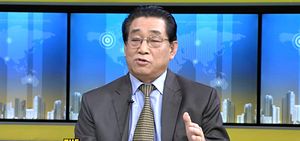On June 21, North Korean Ambassador Kye Chun-yong spoke to WION, an Indian TV network, and expressed his country’s willingness “to talk in terms of the freezing of nuclear testing and missile testing, under certain circumstances.” The interview caught China’s attention right away.
Chinese observers said the expression of North Korea was “very rare,” and the Chinese Foreign Ministry immediately “noticed the statement.”
In the interview, Ambassador Kye Chun-yong explained under what circumstance would North Korea be willing to talk:
For instance, the U.S. side completely stop military exercises, temporarily or permanently. Then we’ll also temporarily stop. Let’s talk about how to solve the Korean issue peacefully.
He also explained why has North Korea has kept testing nuclear devices:
The U.S. is continuously threatening. Trump said so many options including military on the table. So we should be ready for dialogue and the military way.
And his reasoning sounds both reasonable (to North Korean interests) and threatening (to everyone involved in the mess):
Another Korean War means nuclear war. If nuclear war happens on the Korean Peninsula, it will be a fratricidal war. So at any cost we should prevent another Korean war.
Kye emphasized in the interview that North Korea was open to talk to the United States anytime anywhere, “but without any preconditions.”
The “rare expression” was immediately translated and broadcast in China. As the United States is repeatedly calling on China to put more pressure on Pyongyang, North Korea’s sudden concession may leave China somewhat relieved.
Chinese Foreign Ministry Spokesperson Geng Shuang said on June 23 that China had “noted the recent release of some positive signals. The Chinese side believes that this has a positive effect on easing the tension on the peninsula and finally solving the problem through dialogue and consultation.”
Regarding the U.S. pressure on China, Geng also made a moderate complaint:
The outside world has repeatedly asked China to ‘do more’ on the Korean Peninsula issue, but I do not know what this specifically refers to. We have repeatedly said that China has been making unremitting efforts to solve the issue and has played an active and constructive role. But the key to peninsula nuclear issue is not China…To sum up, the Chinese side has been working hard and will continue to work hard, and we hope that other sides can work hard, too.
Undoubtedly, North Korea’s latest straightforward expression did give China some foundation to argue against U.S. pressure, but it also implies China’s awkward position now. North Korea choosing its envoy in India rather than China to release the “positive signal” shows that Pyongyang is trying hard to bypass China in future negotiations, while “the outside world” still believes China plays a decisive role in the game.

































